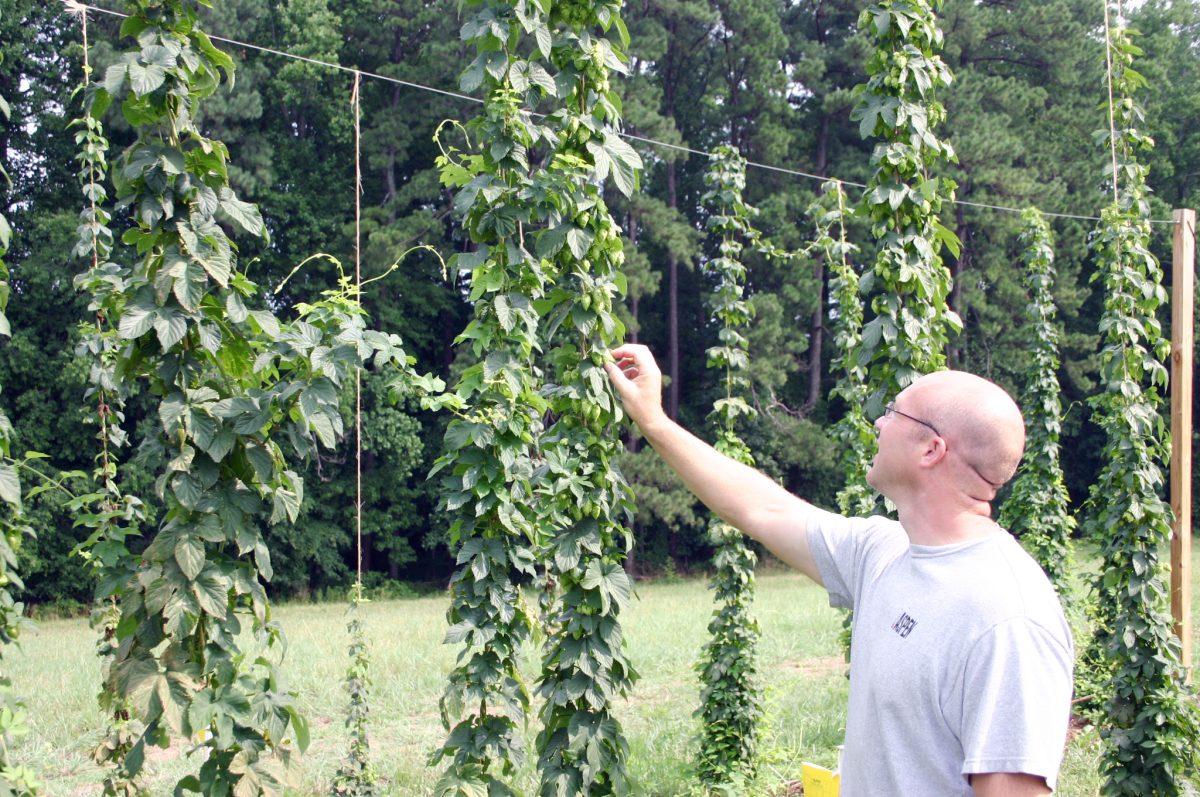 Researchers examine hops being grown for local and national craft breweries as part of the North Carolina Hops Project. " />
Researchers examine hops being grown for local and national craft breweries as part of the North Carolina Hops Project. " />
photo courtesy of Rob Austin
Researchers examine hops being grown for local and national craft breweries as part of the North Carolina Hops Project.
N.C. State researchers working with the North Carolina Hops Project are learning how to grow local hops for some big name breweries.
The project was started by researchers at the University in 2010 and is led by Jeanine Davis, associate professor of horticulture, and Rob Austin, research specialist in soil science.
The NCHP was established due to the booming craft beer industry in North Carolina and the desire for local ingredients by consumers. Most Notably, companies like Sierra Nevada and New Belgium are building brewery sites in North Carolina. Asheville is known as one of the microbrewery capitals of the world, so it is no surprise that there is an interest in growing hops locally in North Carolina.
The goal of the project is to pinpoint which hop cultivars are the most successful in North Carolina and the costs and labor that would be needed to grow hops and sell them.
“Ten varieties of hops were selected for research based on three criteria, including popularity with craft breweries, pest and disease resistance and varieties with high yield resistance,” Austin said.
Growing hops in the south proved to be a problem, as they are usually grown in the pacific northeast because of the plant’s sensitivity to light.
“We are as far south as they would even recommend growing hops commercially,” Austin said. “People have grown without any real research, and don’t read the fine lines and see how challenging it really is.”
The growing site in Raleigh, near Lake Wheeler, is managed by Rob Austin and others working with the Hops Project. The site is now winding down, but Austin will most likely move these to the crop garden for student observation.
Davis has an extension site that she maintains in Asheville. She hopes the new breweries will be interested in research and provide extra funding to keep the site operational.
“There is definitely interest on part of the growers, that is where a lot of my support comes from right now,” Davis said.
Although commercial growing of hops in North Carolina seems unattainable, there is still a heavy presence of family growers in North Carolina looking for extra income from their crops. The problem is that craft breweries contribute a very small percentage of the total amount of beer produced in the United States. What makes it even more challenging is that hops are already a commodity crop grown commercially in the Pacific Northwest region of the U.S.
“We will never replace a commodity crop like that,” Davis said. “Companies will use our crops when they want a seasonal beer that they need fresh hops for.
Davis has been exploring other ways of using locally grown hops to provide income, such as using it medicinally or in dream pillows.
“Right now I think we have eight plus hop growers in the state,” Davis said. “I am looking for good ways for these folks to make profit.”
Austin suggests the hops grown here could be successful if growers took a tourism angle towards their crops. Growers could show how the crop is grown and what goes into brewing like a winery does.
Despite hops traditionally coming from the west coast, breweries will continue to grow in North Carolina. Austin said the culture of Asheville is what makes it a big micro-brewing place, and the local craft beer scene is also emerging in Raleigh.
“The local movement is feeding craft brewery expansion, people want to know they are supporting a local business,” Austin said. “When we started this project there were 38 craft breweries in the state, now there are over 73.”